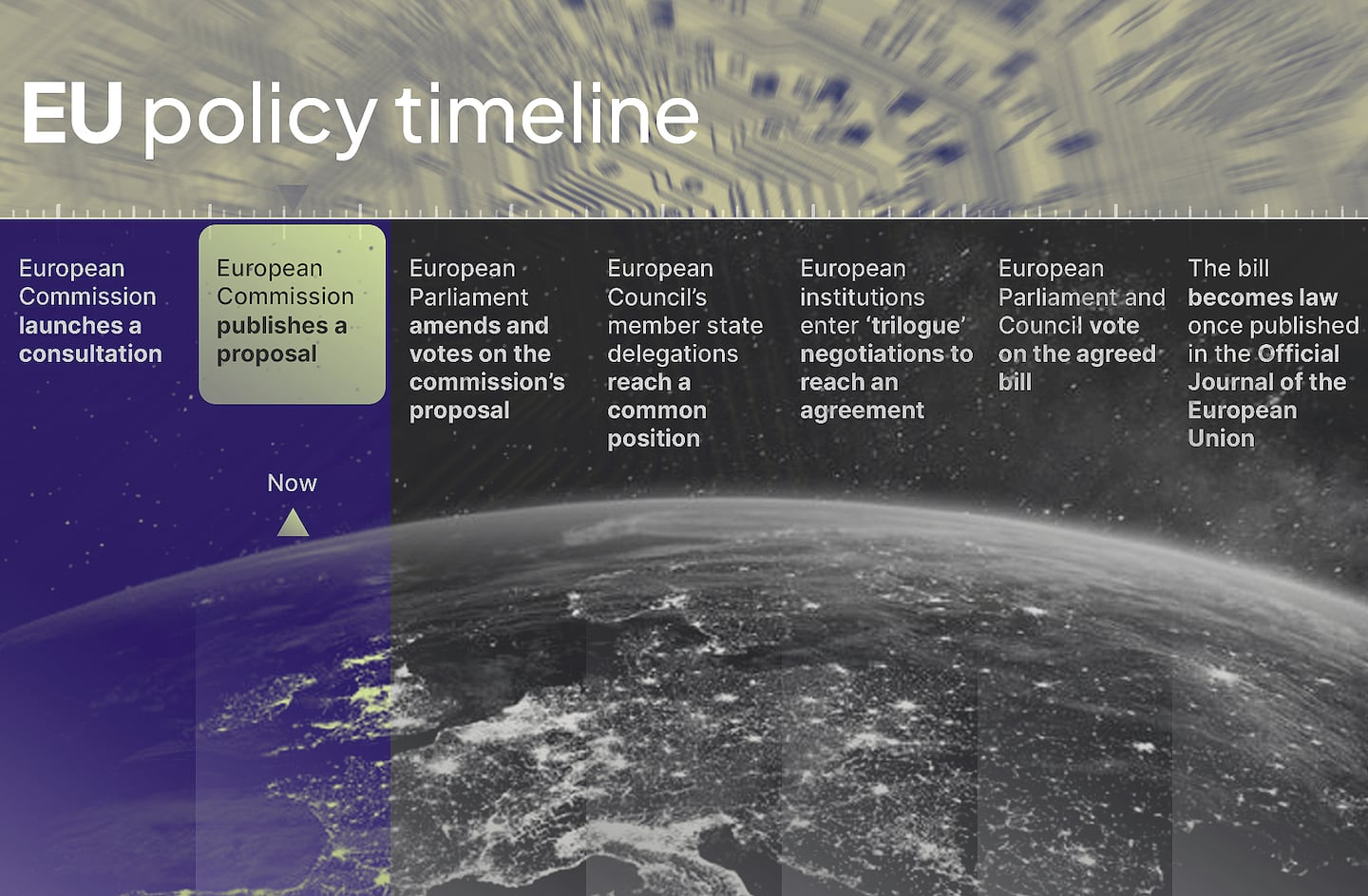- The European Commission published its legislative proposal for a central bank digital currency.
- While the digital euro’s offer to consumers is questioned, Europe’s financial sovereignty is at the heart of the move.
The European Commission promised that a digital euro “is not a Big Brother project” on Wednesday as it published a proposal to introduce a digital currency run by the European Central Bank.
The commission, the starting engine of the European Union’s legislative machinery, aims to place the political guardrails around the bloc’s potential new central bank digital currency.
For authorities, a CBDC would translate hard, central bank-backed cash into the digital world while not replacing it. The ECB is already developing the digital coin, which may become a reality as early as 2026.
NOW READ: Stablecoin laws could give US an edge — if they ever get off the ground
However, policymakers, industry representatives, blockchain advocacy groups, and European citizens have raised fears that a digital euro could create surveillance dystopia, and wonder about the utility for ordinary retail consumers.
Commission representatives pledged that the project’s data privacy will be at the same level of other digital payment methods, with more privacy granted to offline payments.
“This is not a Big Brother project,” European Commissioner for finance Mairead McGuinness told reporters on Wednesday, referring to George Orwell’s “1984.”
She echoed similar pledges from teams behind CBDC projects in the UK and Sweden.
NOW READ: Swedish CBDC head: The state doesn’t care how people pay for things
The commission has argued that a digital euro will protect the EU from being overrun by foreign powers.
“Two thirds of Europe’s digital payments are processed by a handful of global operators,” the European Commission’s executive vice-president Valdis Dombrovskis told reporters.

A digital euro would put European actors at the head of their own market “at a time when global public tensions make us more vulnerable to attacks on our critical infrastructure,” he added.
“It’s not an area where we can afford to stay behind the curve,” Dombrovskis said.
China, for instance, has undertaken public tests of the digital yuan since 2021. Some reports suggest that 261 million Chinese citizens had set up a wallet as of January 2022.
NOW READ: UK lawmakers drop crypto-is-gambling idea and welcome a16z’s riches
ECB executives and McGuiness have both stressed the same point.
“If we don’t provide our own solution, then we run the risk of private stablecoins or foreign central bank digital currencies filling the gap,” McGuinness said about the digital euro in April.
‘Not much benefit’
The privacy and competitveness assurances have done little to dissuade sceptics.
Philipp Sandner, who heads the blockchain centre at the Frankfurt School of Finance and Management, and a founding member of the Digital Euro Association, is among those unconvinced.
He told DL News that it makes sense “to fight for a sovereign infrastructure” in the EU, especially as retail payments are “fully in the hands” of American finance giants like Visa and Mastercard.
NOW READ: ‘I expect this to move quickly:’ New UK crypto laws could be in place by autumn
However, he said: “From a retail perspective there is not much benefit,” and the ECB has “some problems really articulating why we need it.”
With digital payments solutions offered by products like Apple Pay, Google Pay, and PayPal, the digital euro may have tough competition.
For Sandner, the CBDC would function similarly to a prepaid debit card.
It would be hosted on the same commercial banking applications used today, with limits on the amount of the digital currency they can store.
ECB officials have mentioned a €3,000 cap, to avoid excessive bank outflows.
The proposal lays out a few competences for digital euro users. For example, peer-to-peer transactions could be conducted offline, and the currency would be commonly accepted across the bloc.
NOW READ: EU muddies regulatory clarity on crypto with new tax reporting bill
For those without access to smartphones, public bodies such as post offices could assist consumers.
Blockchain-based stablecoins could still play an important role in carrying the value of the euro, Sandner said.
They provide the perks of decentralised technology like high security and a global infrastructure. Whether the digital euro would use blockchain technology will be up to the ECB.
Protecting privacy
Privacy topped the list as the most important feature for consumers in a 2021 survey conducted by the ECB for a digital euro. For some, a CBDC is the beginning of a surveillance dystopia.
Central bank officials have said that they will not have access to users’ data. But the digital euro app would not be issued by the ECB.
Intermediaries like commercial banks will have to collect certain data to adhere to the same anti-money laundering standards as with any other payment forms.
NOW READ: London loses crypto ‘mojo and momentum’ as Revolut hints at Paris move
The offline payments feature may offer additional privacy as banks. If people choose to transfer to each other offline, the banking intermediary would not be able to see the transaction. Yet this only applies to transactions between individuals and not merchants, within the limited holding cap.
Sandnder is “a little bit worried” about the privacy issue, “but not much,” since payment privacy will be on par with the standards on credit card transactions.
His real concern is who is making the rules: “The governance perspective is the problem. Who is governing the system, and who is creating the rules? Because over there, privacy can be created or privacy can be prevented, freedom rights can be affected or not touched.”
Long way yet
While today’s news kick-starts the official process of legislating for a European CBDC, the bloc’s Frankfurt-based central bank has investigated the digital euro over the past two years and built up a prototype.
In October, the bank’s top dogs are expected to decide whether to bring a CBDC into life. If a green light comes, a policy framework will be in the works.
NOW READ: We compared the ‘unbridgeable chasm’ between Europe and US crypto law
Back in Brussels, the legislative proposal will need to make its way to the desks for policymakers in the European Parliament and the European Council’s member state delegations to amend.
Then, the three institutions will need to battle out a final agreement. That process could take years.
Have a tip on EU crypto regulation? Contact the author at inbar@dlnews.com.



